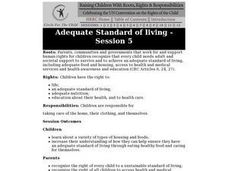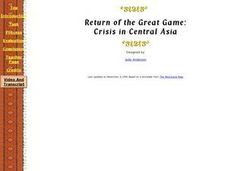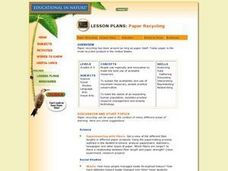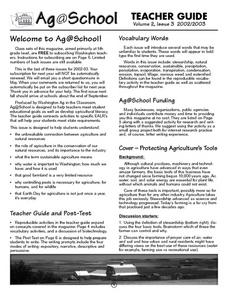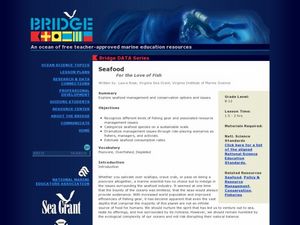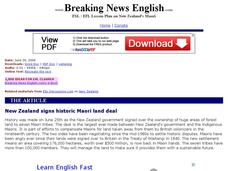Curated OER
Treasure of the Tar
Learners use the Canadian Atlas to discover the natural resources available in various areas of the country. Using the region known as the "Tar Sands", they identify the area's characteristics and develop hypothesis about the future...
Curated OER
Adequate Standard of Living: Children's Rights
Pupils and parents participate in a variety of activities designed to explore the issue of every person's right to adequate housing. They make butter, make models of different types of housing, read books, discuss the rights and...
Curated OER
Crisis In Central Asia
Students, acting as hostile and concerned delegates from competing factions in Central Asia, will participate in an international conference where you will present a position paper which lists your demands. With the guidance of a special...
Curated OER
Heritage: What Would You Take?
Fifth graders explore their own definitions of valuable, and decide what they would choose to take with them if they could only take one item. They define the reasons their items are valuable to them.
Curated OER
Worm Bin Project Data Exchange
Learners work collaboratively to exchange data with their peers (groups of students at other schools) about their worm bin project. They discuss differing findings and hypothesize reasons for these differences.
Curated OER
PAPER RECYCLING
Young scholars examine the availability and use of important resources, people practice conservation. They explore the needs of an expanding human population, societies practice resource management and employ technology.
Curated OER
Get Physical
Fourth graders research a physical exercise using primary source information. They analyze the information and write a report that validates, rejects, or qualifies the information.
Curated OER
Energy Panel Hearings: "Your Town", Saskatchewan
Tenth graders access information to participate in a debate about whether a power plant should be placed in their town. They research an assigned point of view.
Curated OER
Training Table Race
Students investigate the role of the carbohydrates food group in sports performance. The difference between simple and complex carbohydrates, and the performance of cardiovascular activities form the focus of the lesson plan.
Curated OER
What are the Parts of Concrete?
Students examine samples of concrete and sort them through a series of seives to separate it into its individual components. They sort and classify each of the ingredients of the concrete.
Curated OER
Violets, Daffodils, Roses and Thorn
Fourth graders complete a variety of exercises and activities surrounding the scientific and artistic properties of the parts and processes of a plant/flower.
Curated OER
Protecting Agriculture's Tools
Students brainstorm which tools farmers can control and why. They discuss how to conserve water, air and soil. They discuss the role of farmers and how they feed the world.
Curated OER
The Role of Monuments And Memorials
Students investigate the use of monuments and memorials in various cultures in this three day Language Arts or Social Studies lesson. Emphasis is placed on in-class discussions, research, and individual creative projects.
Curated OER
Economics: Property Rights and the Rule of Law
Students examine the economic value of property rights. In a classroom activity, "You're the Economist," they analyze actual research data from establishing land holding titles in Para, Brazil. They assess several case studies about the...
Curated OER
Thinking about Energy
Students navigate through a web-based survey to help engage curiosity about energy concepts. They describe how prior perceptions influence examineing of energy concepts. They evaluate comprehension about concepts of energy.
Curated OER
Children's Health: Children Aren't Little Adults
This lesson is a compilation of interdisciplinary, technology-infused activities that focus on the often complicated and sometimes controversial issues related to toxic chemicals in children's environment. Special emphasis is placed on...
Curated OER
Is Capitalism Good for the Poor? | How Incentives Affect Innovation
Students focus on the role played by a nation's institutions in generating creativity, invention and innovation, and analyzes how innovation promotes the economic growth that raises standards of living and alleviates poverty.
Curated OER
Mitosis and Meiosis
Students model and differentiate between the processes of mitosis and meiosis. In partners, they use yarn and construction paper to create models for each of the phases of mitosis and meiosis then compare the chromosome numbers in each...
Curated OER
MOBILITY, Traveling Lightly: What’s My Footprint?
Pupils calculate their carbon footprint. In this environmental technology lesson plan, students listen to a lecture on climate change. Pupils brainstorm solutions to reduce environmental impact based on travel options. Students calculate...
Curated OER
Seafood: For the Love of Fish
Students role play a scenario specific to decision making in seafood management and conservation. In this marine science lesson, students estimate seafood consumption in their state. They recommend new regulations for better fishery...
Curated OER
Breaking News English: New Zealand Signs Historic Maori Land Deal
In this English worksheet, students read "New Zealand Signs Historic Maori Land Deal," and then respond to 1 essay, 47 fill in the blank, 7 short answer, 20 matching, and 8 true or false questions about the selection.
Curated OER
Plant Growth
First graders investigate how seeds are moved and how plants grow. In this plant growth lesson, 1st graders listen to stories, play a game, and view a PowerPoint about plant growth. Students examine various seeds and recognize how...
Science Education Resource Center at Carleton College
Serc: Finding the Personal Voice of Sustainability
Students explore a more personal connection to sustainability and environmental concerns by reading an article, and rewriting it into a first-person monologue which they will perform.
Science Education Resource Center at Carleton College
Serc: Learning Sustainability With Sim City
Helps educators develop SimCity-based lesson plans that will encourage students to think critically about the challenges facing modern cities. SimCity is a city-building simulation computer game where players become the mayor and design...



